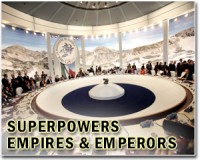| . |  |
. |
Washington (AFP) Feb 14, 2010 With his drive for sweeping change in the deep freeze, President Barack Obama seems unable to bend Congress to his will or coax lawmakers of either party away from rigid ideological positions. Vital planks of Obama's agenda, like a health care overhaul, global warming legislation, and financial regulatory reform are stalled amid a winter of political discontent. And his crusade to drain the bile from Washington is making little headway: political divides seem deeper than when he took office. Old Washington hands lament the disconnect between the White House and Capitol Hill as a far cry from days when presidents like Democrat Lyndon Johnson and Republican Ronald Reagan bulldozed or charmed bills into law. Some critics blame Obama for staying above the fray while priority bills stagger under partisan fights or are laden with bloated spending. Amid a biting economic crisis, Obama is also accused of saddling Congress with an unpopular agenda while voters obsess about huge unemployment. Some say Obama ran a masterful campaign but has yet to master governing and the mix of flattery and threats needed to cajole Congress. For example, a Senate jobs package negotiated between Democrats and Republicans was Thursday watered down by Majority leader Harry Reid, leaving questions about Obama's authority and dashing a victory for bipartisanship. Early on, Obama got a flurry of bills through Congress, including a 787 billion dollar stimulus plan, but since then his progress has slowed. The blame does not entirely rest with the White House though, in an age where radicals tug both parties away from the political center. Compromise-minded lawmakers are all but extinct in a Washington torn by a hyper-partisan riptide. "Congress is much more polarized now... but so is the wider voting public," said congressional scholar Professor Steven Smith of Washington University, St. Louis. Obama also faces a minority Republican Party with no incentive to help a Democratic president pass an agenda they deride as ultra-liberal. Yet Americans tell pollsters they want both parties working together, a fact reflected in recent Obama overtures to his foes. He outshone Republican lawmakers at their retreat, called their leaders to the White House to talk jobs and called a health care summit on February 25. Obama has also rallied Democratic senators, seeking to build support for his policies -- though once lofty hopes of generational change now seem pared down. "He really is trying to reassert himself," in the legislative arena, said Andrew Dowdle, a professor of politics at the University of Arkansas. Republicans are exultant. Their capture of the Massachusetts Senate seat held for decades by the late Edward Kennedy broke the Democratic 60-seat filibuster-proof Senate majority. That gave them power to thwart Obama's bills, leaving the president needing a Republican vote, as well every Democrat and two independents to pass major legislation. Obama seems frustrated his own side is firing blanks -- arguing that with the votes of 59 of the 100 senators, they are still in control. "Our party has gone from having the largest Senate majority in a generation to the second largest Senate majority in a generation," Obama told Senate Democrats this month. "We've got to remember that. We still have to lead." But, Dowdle said, compromise may be a pipe dream because "the parties are so polarized compared to where they were 30 years ago." Obama warned Republicans their new power means they must help lead their country out of its deep hole -- but with mid-term elections on the horizon in November, hope for bipartisanship will likely prove fleeting. Many Republicans see Obama's outreach as a trap, fearing he will brand them obstructionist when they refuse to back him. While the House of Representatives has passed much of Obama's platform, most big items are blocked in the Senate, where the Democratic caucus is anything but a monolithic voting bloc. Some Democrats from conservative states have deep qualms about the impact of his program on their own political prospects. And the few Republican senators who might cast a vote for an Obama priority fear primary challenges from conservatives in their home states. In some ways, Obama's change crusade has come up against realities of the US political system. The government was split into three separate branches by the Founding Fathers to diffuse power and partly to prevent sudden changes of popular sentiment leading to immediate political change.
Share This Article With Planet Earth
Related Links Learn about the Superpowers of the 21st Century at SpaceWar.com Learn about nuclear weapons doctrine and defense at SpaceWar.com
 HIV-positive German pop star charged: prosecutors
HIV-positive German pop star charged: prosecutorsBerlin (AFP) Feb 12, 2010 German prosecutors said Friday they have charged a member of all-female pop group No Angels with causing bodily harm for failing to inform sexual partners that she was HIV positive. Nadja Benaissa, 27, had sex on five occasions between 2000 and 2004 with three people and did not tell them she was infected, even though she had known since 1999, according to the charge sheet. "She was well ... read more |
|
| The content herein, unless otherwise known to be public domain, are Copyright 1995-2010 - SpaceDaily. AFP and UPI Wire Stories are copyright Agence France-Presse and United Press International. ESA Portal Reports are copyright European Space Agency. All NASA sourced material is public domain. Additional copyrights may apply in whole or part to other bona fide parties. Advertising does not imply endorsement,agreement or approval of any opinions, statements or information provided by SpaceDaily on any Web page published or hosted by SpaceDaily. Privacy Statement |